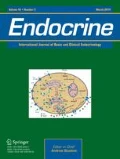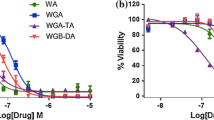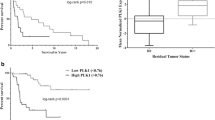Abstract
Purpose
The management of patients with adrenocortical carcinoma (ACC) is challenging. As mitotane and chemotherapy show limited efficacy, there is an urgent need to develop therapeutic approaches. The aim of this study was to investigate the antitumor activity of progesterone and explore the molecular mechanisms underlying its cytotoxic effects in the NCI-H295R cell line and primary cell cultures derived from ACC patients.
Methods
Cell viability, cell cycle, and apoptosis were analyzed in untreated and progesterone-treated ACC cells. The ability of progesterone to affect the Wnt/β-catenin pathway in NCI-H295R cells was investigated by immunofluorescence. Progesterone and mitotane combination experiments were also performed to evaluate their interaction on NCI-H295R cell viability.
Results
We demonstrated that progesterone exerted a concentration-dependent inhibition of ACC cell viability. Apoptosis was the main mechanism, as demonstrated by a significant increase of apoptosis and cleaved-Caspase-3 levels. Reduction of β-catenin nuclear translocation may contribute to the progesterone cytotoxic effect. The progesterone antineoplastic activity was synergically increased when mitotane was added to the cell culture medium.
Conclusions
Our results show that progesterone has antineoplastic activity in ACC cells. The synergistic cytotoxic activity of progesterone with mitotane provides the rationale for testing this combination in a clinical study.





Similar content being viewed by others
Abbreviations
- ACC:
-
adrenocortical carcinoma
- PgR:
-
progesterone receptor
- IC:
-
Interval of Confidence
- MTT:
-
3-(4,5-Dimethyl-2-thiazol)-2,5-diphenyl-2H-tetrazolium bromide
- mPR:
-
progesterone membrane receptor
- PGRMC1:
-
progesterone receptor membrane component 1
References
C.L. Ronchi, M. Kroiss, S. Sbiera, T. Deutschbein, M. Fassnacht, EJE prize 2014: current and evolving treatment options in adrenocortical carcinoma: where do we stand and where do we want to go? Eur. J. Endocrinol. 171, R1–R11 (2014)
M. Terzolo, F. Daffara, A. Ardito, B. Zaggia, V. Basile, L. Ferrari, A. Berruti, Management of adrenal cancer: a 2013 update. J. Endocrinol. Invest. 37, 207–217 (2014)
A. Berruti, E. Baudin, H. Gelderblom, H.R. Haak, F. Porpiglia, M. Fassnacht, G. Pentheroudakis; ESMO Guidelines Working Group, Adrenal cancer: ESMO clinical practice guidelines for diagnosis, treatment and follow-up. Ann. Oncol. 23(Suppl 7), 131–138 (2012)
M. Fassnacht, M. Terzolo, B. Allolio, E. Baudin, H. Haak, A. Berruti, S. Welin, C. Schade-Brittinger, A. Lacroix, B. Jarzab, H. Sorbye, D.J. Torpy, V. Stepan et al. Combination chemotherapy in advanced adrenocortical carcinoma. N. Engl. J. Med. 366, 2189–2197 (2012)
A. Berruti, M. Terzolo, P. Sperone, A. Pia, S. Della Casa, D.J. Gross, C. Carnaghi, P. Casali, F. Porpiglia, F. Mantero, G. Reimondo, A. Angeli, L. Dogliotti, Etoposide, doxorubicin and cisplatin plus mitotane in the treatment of advanced adrenocortical carcinoma: a large prospective phase II trial. Endocr. Relat. Cancer 12, 657–666 (2005)
A. Berruti, M. Fassnacht, H. Haak, T. Else, E. Baudin, P. Sperone, M. Kroiss, T. Kerkhofs, A.R. Williams, A. Ardito, S. Leboulleux, M. Volante, T. Deutschbein, R. Feelders, C. Ronchi, S. Grisanti, H. Gelderblom, F. Porpiglia, M. Papotti, G.D. Hammer, B. Allolio, M. Terzolo, Prognostic role of overt hypercortisolism in completely operated patients with adrenocortical cancer. Eur. Urol. 65, 832–838 (2014)
R. Libé, I. Borget, C.L. Ronchi, B. Zaggia, M. Kroiss, T. Kerkhofs, J. Bertherat, M. Volante, M. Quinkler, O. Chabre, M. Tabarin, F. Beuschlein et al.. Prognostic factors in stage III-IV adrenocortical carcinomas (ACC): an European Network for the Study of Adrenal Tumor (ENSAT) study. Ann. Oncol. 26, 2119–2125 (2015)
M. Volante, C. Buttigliero, E. Greco, A. Berruti, M. Papotti, Pathological and molecular features of adrenocortical carcinoma: an update. J. Clin. Pathol. 61, 787–793 (2008)
S. Puglisi, P. Perotti, D. Cosentini, E. Roca, V. Basile, A. Berruti, M. Terzolo, Decision-making for adrenocortical carcinoma: surgical, systemic, and endocrine management options. Expert. Rev. AntiCancer Ther. 8(11), 1–9 (2018)
C. Fiorentini, M. Fragni, P. Perego, S. Vezzoli, S.A. Bonini, M. Tortoreto, D. Galli, M. Claps, G.A. Tiberio, M. Terzolo, C. Missale, M. Memo, G. Procopio, N. Zaffaroni, A. Berruti, S. Sigala, Antisecretive and antitumor activity of abiraterone acetate in human adrenocortical cancer: a preclinical study. J. Clin. Endocrinol. Metab. 101, 4594–4602 (2016)
G. Attard, A.H. Reid, R.J. Auchus, B.A. Hughes, A.M. Cassidy, E. Thompson, N.B. Oommen, E. Folkerd, M. Dowsett, W. Arlt, J.S. de Bono, Clinical and biochemical consequences of CYP17A1 inhibition with abiraterone given with and without exogenous glucocorticoids in castrate men with advanced prostate cancer. J. Clin. Endocrinol. Metab. 97, 507–516 (2012)
A. Pia, F. Vignani, G. Attard, M. Tucci, P. Bironzo, G. Scagliotti, W. Arlt, M. Terzolo, A. Berruti, Strategies for managing ACTH dependent mineralocorticoid excess induced by abiraterone. Cancer Treat. Rev. 39, 966–973 (2013)
M. Claps, B. Lazzari, S. Grisanti, V. Ferrari, M. Terzolo, S. Sigala, S. Vezzoli, M. Memo, M. Castellano, A. Berruti, Management of severe Cushing’s syndrome induced by adrenocortical carcinoma with abiraterone acetate: a case report. AACE Clin. Rep. 2, 337–341 (2016)
A. Salomon, M. Keramidas, C. Maisin, M. Thomas, Loss of β-catenin in adrenocortical cancer cells causes growth inhibition and reversal of epithelial-to-mesenchymal transition. Oncotarget 6, 11421–11433 (2015)
D. Garg, S.S.M. Ng, K.M. Baig, P. Driggers, J. Segars, Progesterone-mediated non-classical signaling. Trends Endocrinol. Metab. 28, 656–668 (2017)
R.L. Ashley, C.M. Clay, T.A. Farmerie, G.D. Niswender, T.M. Nett, Cloning and characterization of an ovine intracellular seven transmembrane receptor for progesterone that mediates calcium mobilization. Endocrinology 147, 4151–4159 (2006)
V. Boonyaratanakornkit, N. Hamilton, D.C. Márquez-Garbán, P. Pateetin, E.M. McGowan, R.J. Pietras, Extranuclear signaling by sex steroid receptors and clinical implications in breast cancer. Mol. Cell. Endocrinol. 466, 51–72 (2018)
W.E. Rainey, K. Saner, B.P. Schimmer, Adrenocortical cell lines. Mol. Cell. Endocrinol. 228, 23–38 (2004)
E.N. Kornaga, A.C. Klimowicz, N. Guggisberg, T. Ogilvie, D.G. Morris, M. Webster, A.M. Magliocco, A systematic comparison of three commercial estrogen receptor assays in a single clinical outcome breast cancer cohort. Mod. Pathol. 29, 799–809 (2016)
T.C. Chou, P. Talalay, Quantitative analysis of dose−effect relationships: the combined effects of multiple drugs or enzyme inhibitors. Adv. Enzym. Regul. 22, 27–55 (1984)
T.C. Chou, Theoretical basis, experimental design, and computerized simulation of synergism and antagonism in drug combination studies. Pharmacol. Rev. 58, 621–681 (2006)
J. Hofman, D. Ahmadimoghaddam, L. Hahnova, P. Pavek, M. Ceckova, F. Staud, Olomoucine II and purvalanol A inhibit ABCG2 transporter in vitro and in situ and synergistically potentiate cytostatic effect of mitoxantrone. Pharmacol. Res. 65, 312–319 (2012)
S. Sigala, S. Bodei, C. Missale, D. Zani, C. Simeone, S.C. Cunico, P.F. Spano, Gene expression profile of prostate cancer cell lines: effect of nerve growth factor treatment. Mol. Cell. Endocrinol. 284, 11–20 (2008)
C. Fiorentini, S. Bodei, F. Bedussi, M. Fragni, S.A. Bonini, C. Simeone, D. Zani, A. Berruti, C. Missale, M. Memo, P.F. Spano, S. Sigala, GPNMB/OA protein increases the invasiveness of human metastatic prostate cancer cell lines DU145 and PC3 through MMP-2 and MMP-9 activity. Exp. Cell Res. 323, 100–111 (2014)
V. Porrini, I. Sarnico, M. Benarese, C. Branca, M. Mota, A. Lanzillotta, A. Bellucci, E. Parrella, L. Faggi, P.F. Spano, B.P. Imbimbo, M. Pizzi, Neuroprotective and anti-apoptotic efects of CSP-1103 in primary cortical neurons exposed to oxygen and glucose deprivation. Int. J. Mol. Sci. 18, E184 (2017)
M. Babagana, S. Johnson, H. Slabodkin, W. Bshara, C. Morrison, E.S. Kandel, P21-activated kinase 1 regulates resistance to BRAF inhibition in human cancer cells. Mol. Carcinog. 56, 1515–1525 (2017)
N.M. Bashour, S. Wray, Progesterone directly and rapidly inhibits GnRH neuronal activity via progesterone receptor membrane component 1 endocrinology. Endocrinology 153, 4457–4469 (2012)
V. Lodde, J.J. Peluso, A novel role for progesterone and progesterone receptor membrane component 1 in regulating spindle microtubule stability during rat and human ovarian cell mitosis. Biol. Reprod. 84, 715–722 (2011)
A. Chimento, R. Sirianni, I. Casaburi, F. Zolea, P. Rizza, P. Avena, R. Malivindi, A. De Luca, C. Campana, E. Martire, F. Domanico, F. Fallo, G. Carpinelli, L. Cerquetti, D. Amendola, A. Stigliano, V. Pezzi, GPER agonist G-1 decreases adrenocortical carcinoma (ACC) cell growth in vitro and in vivo. Oncotarget 6, 19190–19203 (2015)
R.S.Y. Wong, Apoptosis in cancer: from pathogenesis to treatment. J. Exp. Clin. Cancer Res. 30, 87 (2011)
A.O. Mueck, X. Ruan, H. Seeger, T. Fehm, H. Neubauer, Genomic and non-genomic actions of progestogens in the breast. J. Steroid Biochem. Mol. Biol. 142, 62–67 (2014)
T. Wang, W.E. Rainey, Human adrenocortical carcinoma cell lines. Mol. Cell. Endocrinol. 351, 58–65 (2012)
K.M. Scarpin, J.D. Graham, P.A. Mote, C.L. Clarke, Progesterone action in human tissues: regulation by progesterone receptor (PR) isoform expression, nuclear positioning and coregulator expression. Nucl. Recept. Signal. 7, e009 (2009)
J.H. Check, The role of progesterone and the progesterone receptor in cancer. Expert Rev. Endocrinol. Metab. 12, 187–197 (2017)
A. Leibovitz, W.M. McCombs 3rd, D. Johnston, C.E. McCoy, J.C. Stinson, New human cancer cell culture lines. I. SW-13, small-cell carcinoma of the adrenal cortex. J. Natl. Cancer Inst. 51, 691–697 (1973)
V. Boonyaratanakornkit, E. McGowan, L. Sherman, M.A. Mancini, B.J. Cheskis, D.P. Edwards, The role of extranuclear signaling actions of progesterone receptor in mediating progesterone regulation of gene expression and the cell cycle. Mol. Endocrinol. 21, 359–375 (2007)
S.Z. Bu, D.L. Yin, X.H. Ren, L.Z. Jiang, Z.J. Wu, Q.R. Gao, G. Pei, Progesterone induces apoptosis and up-regulation of p53 expression in human ovarian carcinoma cell lines. Cancer 79, 1944–1950 (1997)
V. Syed, S.M. Ho, Progesterone-induced apoptosis in immortalized normal and malignant human ovarian surface epithelial cells involves enhanced expression of FasL. Oncogene 22, 6883–6890 (2003)
B. Formby, T.S. Wiley, Bcl-2, survivin and variant CD44 v7-v10 are downregulated and p53 is upregulated in breast cancer cells by progesterone: inhibition of cell growth and induction of apoptosis. Mol. Cell. Biochem. 202, 53–61 (1999)
K. Horita, N. Inase, S. Miyake, B. Formby, H. Toyoda, Y. Yoshizawa, Progesterone induces apoptosis in malignant mesothelioma cells. Anticancer Res. 21, 3871–3874 (2001)
F. Atif, S. Yousuf, D.G. Stein, Anti-tumor effects of progesterone in human glioblastoma multiforme: role of PI3K/Akt/mTOR signaling. J. Steroid Biochem. Mol. Biol. 146, 62–73 (2015)
Y. Wang, P. Hanifi-Moghaddam, E.E. Hanekamp, H.J. Kloosterboer, P. Franken, J. Veldscholte, H.C. van Doorn, P.C. Ewing, J.J. Kim, J.A. Grootegoed, C.W. Burger, R. Fodde, L.J. Blok, Progesterone inhibition of Wnt/beta-catenin signaling in normal endometrium and endometrial cancer. Clin. Cancer Res. 15, 5784–5793 (2009)
Funding
This work was supported by: AIRC project IG17678 (PI: M.T.); AIRC project IG14411 (PI: A.B.); Fondazione Camillo Golgi, Brescia; University of Brescia local grants; private donation of “gli Amici di Andrea” in memory of Andrea Gadeschi; private grant from the amateur dramatics group “Attori non per caso”, Parish church of Collio Valtrompia (Brescia). M.F. was supported by a grant from the Italian Society of Pharmacology.
Author information
Authors and Affiliations
Corresponding author
Ethics declarations
Conflict of interest
The authors declare that they have no conflict of interest.
Electronic supplementary material
Rights and permissions
About this article
Cite this article
Fragni, M., Fiorentini, C., Rossini, E. et al. In vitro antitumor activity of progesterone in human adrenocortical carcinoma. Endocrine 63, 592–601 (2019). https://doi.org/10.1007/s12020-018-1795-x
Received:
Accepted:
Published:
Issue Date:
DOI: https://doi.org/10.1007/s12020-018-1795-x




